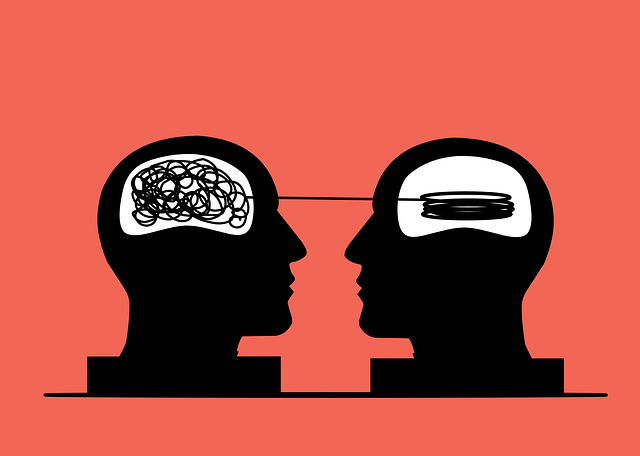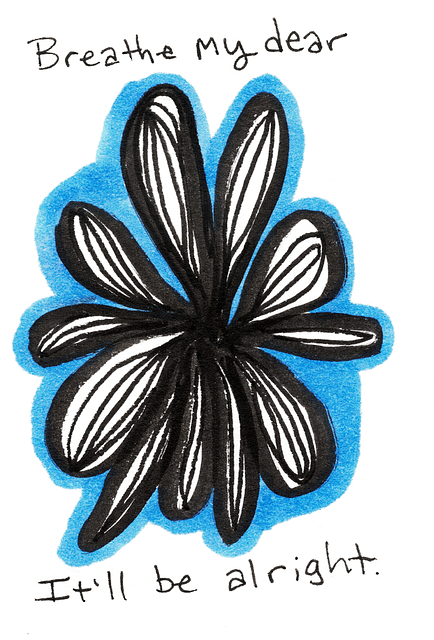Mindfulness meditation is an ancient practice that empowers adults seeking therapy through self-discovery, emotional well-being, and stress management. Combined with Exposure and Response Prevention (ERP) techniques, it helps confront difficult thoughts and triggers, building inner strength for mental health improvement. Regular mindfulness practice enhances emotional regulation, self-awareness, and personal growth, creating supportive environments in community outreach programs. A dedicated meditation space integrates ERP principles, offering a safe haven for mental wellness and burnout prevention akin to healthcare provider strategies. Mindfulness techniques like breathing exercises and body scans disrupt stressful thoughts and improve reaction control, fostering better conflict resolution skills. This practice enhances cultural competency among healthcare providers, cultivating inner peace, resilience, and a calm mindset.
“Unwind your mind and embrace tranquility with our comprehensive guide to mindfulness meditation. In today’s fast-paced world, finding inner peace is more vital than ever. We delve into ‘Understanding Mindfulness Meditation’ as a powerful tool for adults seeking stress relief and improved focus. Explore the therapeutic benefits of Exposure and Response Prevention techniques tailored for mental health. From setting up your serene meditation space to mastering techniques that calm the mind, this article equips you with the knowledge to integrate mindfulness into daily life, fostering long-term well-being.”
- Understanding Mindfulness Meditation: A Foundation for Adults
- The Role of Exposure and Response Prevention in Therapy
- Setting Up Your Meditation Space: Creating a Calming Environment
- Techniques to Enhance Focus and Reduce Stress During Practice
- Integrating Mindfulness into Daily Life: Sustaining Long-Term Benefits
Understanding Mindfulness Meditation: A Foundation for Adults

Mindfulness meditation is a practice that encourages individuals to focus on the present moment, non-judgmentally, fostering awareness and acceptance. For adults seeking therapeutic support, this ancient technique offers a powerful tool for self-discovery and emotional well-being. By cultivating mindfulness, one can develop coping skills and enhance their ability to navigate life’s challenges with resilience. This practice is particularly beneficial in managing stress, anxiety, and even symptoms of depression, as it promotes a deeper understanding of one’s thoughts and emotions.
In the context of therapy for adults, exposure and response prevention (ERP) techniques often complement mindfulness meditation. ERP helps individuals confront and manage difficult thoughts or triggers without engaging in habitual coping responses. Together, these practices empower adults to build inner strength, develop effective coping strategies, and improve their overall mental health. Through regular practice, one can enhance their ability to remain calm under pressure, foster better emotional regulation, and cultivate a more profound sense of self-awareness—all essential components for personal growth and community outreach program implementations aimed at fostering supportive environments.
The Role of Exposure and Response Prevention in Therapy

In therapy for adults, Exposure and Response Prevention (ERP) is a powerful technique that plays a pivotal role in addressing specific fears and anxieties. This approach involves gradually exposing individuals to situations or stimuli they may avoid due to associated negative thoughts or emotions. By doing so, it empowers them to manage their responses and challenge unhelpful beliefs. For instance, someone with social anxiety might start by imagining themselves in a crowded room, then move on to watching videos of social interactions, before eventually engaging in real-life social gatherings. This process helps build resilience and fosters positive thinking.
ERP is particularly effective for trauma support services, enabling individuals to confront and overcome past traumatic experiences. By facing their fears in a controlled environment, clients can develop new coping mechanisms and boost their confidence. This therapy method encourages individuals to stay in the present moment, preventing them from avoiding or escaping distressing situations, which is key to long-lasting healing and improved mental well-being.
Setting Up Your Meditation Space: Creating a Calming Environment

Setting up a dedicated meditation space is a powerful step towards incorporating mindfulness into your daily routine. Create an environment that fosters calm and serenity by minimizing distractions and incorporating soothing elements. Consider soft lighting, comfortable seating, and perhaps a small water feature to enhance relaxation. Personalize your space with items that inspire peace, such as plants or artwork that resonates with you. This mindful approach to preparing your sanctuary mirrors the practice of Exposure and Response Prevention (ERP) therapy for adults, where gradual exposure to triggers helps reduce anxiety responses.
Think of it as a form of crisis intervention guidance, transforming your immediate surroundings into a safe haven for mental health awareness and burnout prevention strategies. By creating this calming space, you’re taking proactive measures similar to the techniques used in healthcare provider burnout prevention strategies. Whether you’re seeking mindfulness meditation practice guidance or simply looking for ways to unwind after a long day, a well-crafted meditation environment can be a valuable tool in your mental wellness arsenal.
Techniques to Enhance Focus and Reduce Stress During Practice

Mindfulness meditation is a powerful tool for adults seeking therapy and self-care practices to enhance focus and reduce stress. Techniques such as mindful breathing exercises and body scans can help calm the mind and ease tension in the body, making it easier to stay present during practice. By focusing on the sensation of each breath or progressively relaxing muscle groups, individuals can disrupt stressful thoughts and gain better control over their reactions.
Additionally, exposure and response prevention (ERP) strategies, often utilized in therapy for adults dealing with mental illness stigma reduction efforts, can be applied during mindfulness meditation. This involves gradually exposing oneself to stressful situations while preventing typical reactive behaviors, ultimately desensitizing individuals to triggers. Regular practice strengthens focus, enhances emotional regulation, and promotes a deeper sense of calm, making it an effective method for managing stress and improving overall well-being.
Integrating Mindfulness into Daily Life: Sustaining Long-Term Benefits

Integrating mindfulness into daily routines can significantly enhance overall well-being and provide lasting benefits for adults seeking therapy, such as Exposure and Response Prevention (ERP) treatment. Mindfulness encourages individuals to focus on the present moment, observing thoughts and sensations without judgment. This practice allows one to develop a deeper understanding of their emotions and triggers, which is crucial in managing anxiety and stress. By fostering mindfulness, adults can improve their emotional regulation skills, enabling them to navigate challenging situations with more clarity and composure.
Moreover, incorporating mindfulness techniques like meditation into daily life promotes better conflict resolution skills. It helps individuals respond mindfully to stressors, encouraging thoughtful actions rather than impulsive reactions. This is particularly relevant in healthcare settings where providers benefit from cultural competency training, enhancing their ability to connect with diverse patients through mindful communication. Ultimately, the practice of mindfulness cultivates a sense of inner peace and resilience, empowering individuals to embrace life’s challenges with a calm and balanced mindset, aligning with the core principles of Mind Over Matter.
Mindfulness meditation, as explored in this guide, offers adults a powerful tool for managing stress and enhancing mental well-being. By understanding its foundational principles and integrating practices like exposure and response prevention, individuals can create lasting changes in their daily lives. A dedicated meditation space, coupled with techniques to focus the mind, allows for deeper connection and mindfulness. This holistic approach, supported by therapy for adults, ensures that the benefits of mindfulness extend beyond temporary calm, fostering a more resilient and balanced state of being.










